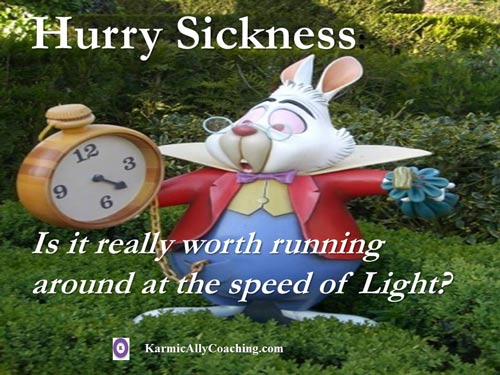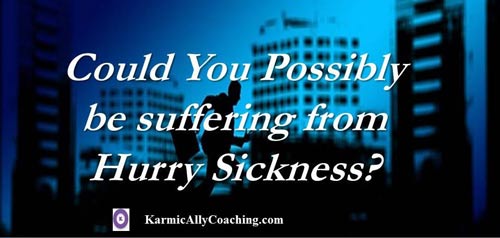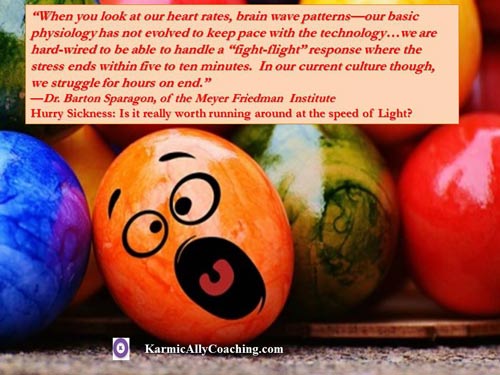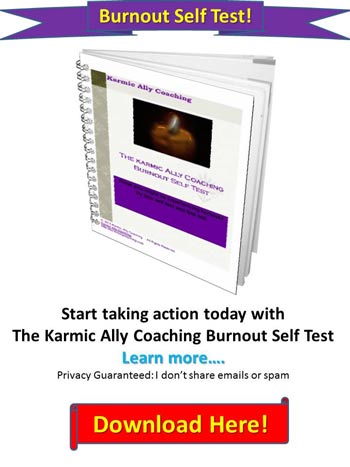
Hurry Sickness shows up in our everyday activities.
Driving home on the highway at the maximum allowed speed limit, I see cars whizzing past me at 80 or 90 kms/hr. I smile knowing we’ll meet up again at the traffic light that divides commuters taking a clover turn where I’ll exit and those going forward.
There’s a digital signboard near the traffic light that blinks “Speed Thrills but also Kills”.
Then I feel sad because I know many of the drivers are showing symptoms of Hurry Sickness. It’s a malady I used suffer from once upon a time. That was until I realized what it was doing to my health and general quality of life.
I didn’t know it at the time and guess not many of us do until we fall prey to stress-related illnesses.
By definition, Hurry Sickness is “a behavior pattern characterized by continual rushing and anxiousness; an overwhelming and continual sense of urgency.”
As if that isn’t bad enough, it’s also defined as “A malaise in which a person feels chronically short of time, and so tends to perform every task faster and to get flustered when encountering any kind of delay.”
Sounds familiar?
Origin of Hurry Sickness
The phrase Hurry Sickness was coined about 40 years ago by Dr. Meyer Friedman, a prominent cardiologist who noticed that all of his heart disease patients had common behavioral characteristics. The most obvious being that they were in a chronic rush. So much so that they wore the chairs in the doctor’s waiting room down on the front first from sitting at the edge of the seats.
He also coined the term ‘type A personality’.
Dr. Barton Sparagon, of the Meyer Friedman Institute, noted that chronic impatience associated with hurry sickness was damaging not only to our social environment, but to our physical health. It builds, and then it doesn’t take much to explode.
Hurry sickness, or chronic rush, should not be taken lightly because it contributes to stress-related illnesses including heart attacks, digestive problems, anxiety and immune disorders.
Could You Possibly be suffering from Hurry Sickness?

Suffering from Hurry Sickness or Chronic Rush is not a black or white illness. If you were to say that you didn’t suffer from it, then it’s either because you are not aware of it or are in denial.
In case you really don’t have Hurry Sickness, then hats off! Keep doing whatever it is you’re doing for the sake of your heart and health.
The majority of us suffer from it occasionally or chronically.
Here are some clues that you might need help.
- Your internet speed going slow gets you crabby and nasty.
- You check your emails first thing in the morning and last thing at night.
- You take your dog for a walk and within 30 seconds get irritated. All because Rufus wants to smell around a bit before doing his Call of Nature.
- You’re waiting at the traffic light and it turns green and you start counting the cars in front of you to see if you can jump in if it turns amber or whether you can move into a faster lane (who cares if you end up having an accident?)
- You don’t want to wait too long at the check-out counter or in the bank line and start assessing which line is moving faster or is shorter (so what if you irritate everyone around you?)
- You often find yourself interrupting the person with whom you are talking (you’re impatient and want to get to the point asap)
- Your spouse, friends, or colleagues tell you to take it easy or slow down out of concern (how irritating!)
- You talk fast, walk fast and pride yourself as a multi-tasker (so what if you don’t complete anything and confuse people around you?)
- You’ve lost touch friends because you don’t have time to meet them (your idea of keeping in touch is liking and commenting on their Facebook posts even though you are in the same city and can easily meet up for a cup of coffee).
- You feel proud that you thrive under pressure (you even say it in job interviews) but as soon as you go on vacation, you fall sick or take longer than normal to recover from the flu or a cold. It’s because you’ve played havoc with your body and its suffering from adrenal exhaustion.
- Worse yet, you experience burnout.
Technology has a hand in abetting this malady.
One of the many reasons why there is an increase of cases of people, especially corporate professionals suffering from Hurry Sickness is the increasing prevalence of technology which speeds up things and compresses what we can do in a limited period of time. This creates a sense of urgency in its wake.
Think of what life was like before you had a computer, smart phone, washing machine, remote control television with recorder – you get the drift.
Technology is supposed to be our friend and support but we often forget that we are not machines, we are humans and we have different capacities and resilience levels.

Is there a cure for Hurry Sickness?
Yes, there is a cure for Chronic Rush but it isn’t a quick fix solution.
It requires becoming aware of the malady and being ready to make the required habit and lifestyle changes.
If you feel you require professional help, then reach out and seek it. There’s no shame in admitting you have a problem that needs to be solved and requires support.
In fact, it’s brave to want to change a habit that is ruining your health, family life and career.
Here are a few of things you can do to jumpstart your road to recovery.
I really want you to take action, so here are the tips – in slide form too!
- Be grateful for all that is good in your life. Start a Gratitude Journal and make at least 3 entries before going to bed at night.
- If you are planning to add a new task to your schedule, ask yourself – is this really important? If the answer is yes, then remove another less priority task so you don’t feel overwhelmed. Manage your time targets.
- Take a morning walk and admire the trees and flowers. Observe life. Try the Nature Walking Meditation.
- Be positive. If something is not going as planned, think of something that is going right and work from a place of ‘it can be done’.
- Do breath work exercises, especially pranayam to give your brain more oxygen to keep it productive.
- Make it a point to take a break for 5 minutes every hour. Get up from your desk and walk around. Go make yourself a cup of tea or other activity that gives you a break.
- Put your mobile phone on silent mode while eating and chat with your family members.
- Create boundaries and “non-negotiables”. Spend as much time as you can doing things you are positive about.
- See your friends in the real world. Did you know that a lack of or few social relationships increases your mortality rate?
- Be realistic – Rome wasn’t built in a day. You have time to get things done when you set achievable goals with a stretch.
With a little effort on your part, you’ll find you have all the time in the world to focus on what really matters. Hurry Sickness will be a thing of the past. You’ll also know when you are returning to bad habits and can take preventive measures.
Which action will you start today to cure your Hurry Sickness?




 I adhere to the Certified Coaches Alliance Code of Ethics and Standards. A copy is available on request.
I adhere to the Certified Coaches Alliance Code of Ethics and Standards. A copy is available on request.
 Let's Talk through the Connect Form:
Let's Talk through the Connect Form: